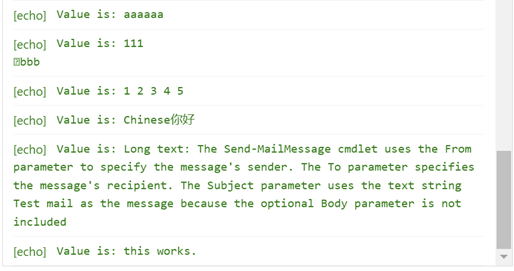We pass over 10 parameters to our iMacros programmatically using VB.Net, some of which are long text. They are used to fill a form. Do you have any plans to introduce similar functionality in your product? I read that you can pass 3 parameters thru the command line, or read more from a text file, but neither one of these are adequate. Saving sensitive parameters to a text file, as well as issues with having carriage returns in a text in a csv file make the second option unappealing. We are considering switching from iMacros to your product. Thank you.
You can pass infinite parameters via url and then extrapolate them as you like and save them in separate variables.
You don’t need to rely on the default variables since you can create the url as you prefer and then save the individual parts in variables of your choice
Correct, ui.vision can send only cmd_var1, cmd_var2 and cmd_var3. These variable names are fixed.
But as @newuserkantu mentioned, there is a good workaround. You can combine all your 10+ values into one long string, and then, inside the macro, split the string into its part again:
In the macro below I show how it is done. Assume !cmd_var1 would contain this string:
aaaaaaXXX111\n\bbbbXXX1 2 3 4 5XXXChinese你好XXXLong text: The Send-MailMessage cmdlet uses the From parameter to specify the message’s sender. The To parameter specifies the message’s recipient. The Subject parameter uses the text string Test mail as the message because the optional Body parameter is not includedXXXthis works.
and then inside the macro split the string at XXX. So now the array (“a” in the macro below) contains the separate values.
You can now use e. g. forEach to loop over this array, or get your values with the [x] array notation:
echo | Value1 is ${a[0]}echo | Value2 is ${a[1]}- …
echo | Value30 would be in ${a[29]}
Result:

Macro:
{
"Name": "split string",
"CreationDate": "2023-2-7",
"Commands": [
{
"Command": "store",
"Target": "aaaaaaXXX111\\n\\bbbbXXX1 2 3 4 5XXXChinese你好XXXLong text: The Send-MailMessage cmdlet uses the From parameter to specify the message's sender. The To parameter specifies the message's recipient. The Subject parameter uses the text string Test mail as the message because the optional Body parameter is not includedXXXthis works.",
"Value": "var1",
"Description": ""
},
{
"Command": "executeScript_Sandbox",
"Target": "s = ${var1}; myArray = s.split(\"XXX\"); return myArray;",
"Value": "a",
"Description": ""
},
{
"Command": "forEach",
"Target": "a",
"Value": "value",
"Description": ""
},
{
"Command": "echo",
"Target": "Value is: ${value}",
"Value": "green",
"Description": ""
},
{
"Command": "end",
"Target": "",
"Value": "",
"Description": ""
},
{
"Command": "comment",
"Target": "You can also access the array values this way:",
"Value": "",
"Description": ""
},
{
"Command": "echo",
"Target": "Value1 = ${a[0]}",
"Value": "blue",
"Description": ""
},
{
"Command": "echo",
"Target": "Value2 = ${a[1]}",
"Value": "pink",
"Description": ""
},
{
"Command": "echo",
"Target": "Value3 = ${a[2]}",
"Value": "brown",
"Description": ""
}
]
}
Ok, thank you all for your response. I will have to study your posts since I am new to the product.
Congrats you’ve created some really excellent macro code
It’s 2025 now and I started looking again at Ui Vision to replace iMacros having several setbacks. Now regarding this topic again I will need to find a solution to pass many parameters to Ui Vision from a VB.Net app, but they need to be confidential and not passed by a command line or URL, which can be saved in a history. These params contain sensitive data, so I need to pass them internally as I did in iMacros. Any suggestions? Thank you.
I have not tried that but maybe you can store the values within your VB.net into a session variable. The do only exist in memory as long as the browser is open. In Kantu you could try to get the session values back with a javascript and store them in Kantu to process.
If I understand correctly Ui Vision cannot replicate the way iMacros integrates with VB.Net where I can programatically control it, including passing parameters. If so, what product can you recomment that can do it? Also saving downloaded files to a predefined folder and file name is not wotrking as well (tried it in Chrome and posted about is unsuccesfully). It worked great with the iMacros browser. Any plans to make these features avaiable to Ui Vision? Thank you.
you can save to CSV
ui vision can read from CSV file
number of variables will be lot depending upon number of values to be passed
Thank you for your advise. Is it possible to delete the CSV file using Ui Vision after the parameters are read, because of privacy issues? Also any examples would be apreciated. Thank you.
no but you can create solution
create a batch file to delete CSV
run batch file using xrun